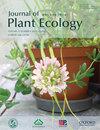Ecological principles to guide the development of crop variety mixtures
IF 3.9
2区 环境科学与生态学
Q2 ECOLOGY
引用次数: 1
Abstract
Crop variety mixtures can provide many benefits, including pathogen suppression and increased yield and yield stability. However, these benefits do not necessarily occur in all mixtures, and the benefits of diversity may be compromised by disadvantages due to increased crop heterogeneity. In-field development of mixtures by assembling many combinations of crop genotypes without prior expectation about which genotypes need to be combined to produce well-performing mixtures results in prohibitively large designs. Therefore, effective tools are required to narrow down the number of promising variety mixtures, and to then identify in experiments which of these deliver the highest benefits. Here, we first review current knowledge about the mechanisms underlying effects in ecological diversity experiments and in current agricultural applications. We then discuss some of the principal difficulties arising in the application of this knowledge to develop good variety mixtures. We also discuss non-conventional approaches to solve some of these issues. In particular, we highlight the potential and limitations of trait-based methods to determine good variety mixing partners, and argue that non-traditional traits and trait-derived metrics may be needed for the trait-based approach to deliver its full potential. Specifically, we argue that good mixing partners can be identified using modern genetic and genomic approaches. Alternatively, good mixtures may be obtained by combining varieties that respond differently to environmental variation; such varieties could easily be identified in standard variety testing trials. Preliminary analyses show that niche differences underlying the different environmental responses can indicate functional complementarity and promote mixture yield and yield stability.指导作物品种杂交发展的生态学原则
作物品种混合物可以提供许多好处,包括抑制病原体、提高产量和产量稳定性。然而,这些好处并不一定出现在所有混合物中,多样性的好处可能会因作物异质性增加而受到不利影响。在没有事先预期哪些基因型需要组合才能生产出性能良好的混合物的情况下,通过组装作物基因型的许多组合来进行混合物的田间开发,结果会产生令人望而却步的大设计。因此,需要有效的工具来减少有前景的品种混合物的数量,然后在实验中确定其中哪些品种的益处最大。在这里,我们首先回顾了目前关于生态多样性实验和当前农业应用中潜在影响机制的知识。然后,我们讨论了在应用这些知识开发优良品种混合物时出现的一些主要困难。我们还讨论了解决其中一些问题的非常规方法。特别是,我们强调了基于特征的方法在确定好的品种混合伙伴方面的潜力和局限性,并认为基于特征的方式可能需要非传统特征和特征衍生指标来发挥其全部潜力。具体而言,我们认为可以使用现代遗传学和基因组学方法来确定良好的混合伴侣。或者,可以通过组合对环境变化有不同反应的品种来获得良好的混合物;这样的品种可以很容易地在标准品种试验中鉴定出来。初步分析表明,不同环境反应的生态位差异可以表明功能互补性,促进混合物产量和产量稳定性。
本文章由计算机程序翻译,如有差异,请以英文原文为准。
求助全文
约1分钟内获得全文
求助全文
来源期刊

Journal of Plant Ecology
生物-植物科学
CiteScore
4.60
自引率
18.50%
发文量
134
审稿时长
3 months
期刊介绍:
Journal of Plant Ecology (JPE) serves as an important medium for ecologists to present research findings and discuss challenging issues in the broad field of plants and their interactions with biotic and abiotic environment. The JPE will cover all aspects of plant ecology, including plant ecophysiology, population ecology, community ecology, ecosystem ecology and landscape ecology as well as conservation ecology, evolutionary ecology, and theoretical ecology.
 求助内容:
求助内容: 应助结果提醒方式:
应助结果提醒方式:


